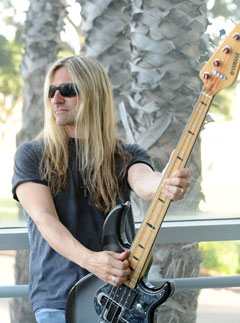


When the bassist from the sunny pop-metal band White Lion lands a gig with fast, ferocious Megadeth, it sounds a bit like a good boy gone to the Dark Side. But in fact, James LoMenzo has long excelled at all shades of rock and metal.
You can get pretty much any sound from the past 50 years out of this bass.
"White Lion was my first big-record-deal group," says Brooklyn-born LoMenzo. "But I played with a lot of cool people before, most notably a band with a fellow named Bobby Rondinelli, the drummer from Ritchie Blackmore's Rainbow. I got to play trio shows with Bobby and Ritchie, which was kind of mind-melting for a 19-year-old like me. So even before White Lion, I was busy."
But not as busy as he became after White Lion went into hibernation in the early '90s. "White Lion was stuck with the image of a pretty-boy band," James recalls. "It was fun, but I always felt like I got out the back door just in time. Luckily, I ran into the right people who wanted to strip it down and play music for music's sake."

One such person was Ozzy Osbourne guitarist Zakk Wylde. Ongoing jam sessions with Wylde coalesced into a new band, Pride and Glory. "Zakk and I had this symbiotic, old-blues style that really worked well," observes James. "Pride and Glory was like a newer version of Cream, in that we had structured songs, but we could also spin them off into jams."
LoMenzo went on to play with Ace Frehley, David Lee Roth, Slash"s Snakepit, and another Zakk Wylde project, Black Label Society. "I just sort of became an all-around 'bass-smith,' if you will," he says.
Even as a kid, LoMenzo was a versatile musician. "I got started with the Beatles," he says. "Paul McCartney grabbed my ear right away. Then I started listening to the Who. I played French horn, and so did John Entwistle from the Who, so I thought, "Wow, this guy does the same thing I do!" I put together a seven-piece band with horns, and my parents let us rehearse in our basement. We played Chicago and Who songs, and I jumped between French horn and bass." LoMenzo"s French horn playing earned him a scholarship to Brooklyn College, but he wound up moving to California and focusing on bass instead.
In 2006, when LoMenzo learned that a revamped Megadeth needed a new bassist, he auditioned for bandleader Dave Mustaine. "I played solo in his manager's office," James recalls. "Dave said, 'We have a gig in Dubai in three weeks--can you learn 23 songs?' 'Sure,' I said. But when I started learning the songs, I realized, my God, these things are opuses! Every song is six minutes long, with lots of different sections. But the gig in Dubai went famously, and we just moved on from there."
Touring in support of the group"s recent United Abominations album, LoMenzo plays a new Yamaha custom BB-style bass. "When I approached Yamaha, I had a very definitive idea of what I wanted," he says. "It has a bolt-on neck, because on neck-through basses, the envelope of the notes is far too long for this genre of music. It has an alder body and a full maple neck. There"s a P-style middle pickup, and then the same pickup mirrored in reverse at the bridge, which creates interesting, complex harmonics. Meanwhile, there"s a big EB-0-style pickup in the neck position, an idea I got from Billy Sheehan"s Yamaha bass. I can use that neck pickup for that old, grunting Felix Pappalardi/Jack Bruce sound, though that"s not something I do much with Megadeth. Between the three pickups, it"s an "every rock" bass--you can get pretty much any sound from the past 50 years out of it. It's an amazing instrument, and I can't put it down."
After playing with Blackmore, Wylde, Slash, Frehley, Mustaine, and White Lion"s Vito Bratta, what advice does LoMenzo have about collaborating with larger-than-life guitarists? "You've got to hit it as hard as they do," he advises. "And as I learned from listening to John Entwistle, it's all in the treble. Even though the bass puts out a lot of lows in the 70 to 80 Hz range, without strong treble in the 1.6 to 2 kHz range, your sound gets lost. I was delighted when I got into Megadeth, because Dave Mustaine said, "The only way to get great-sounding bass is to punch up the treble." And I thought, "Yes! This guy gets it!"
(Photography Credit: Rob Shanahan)
























